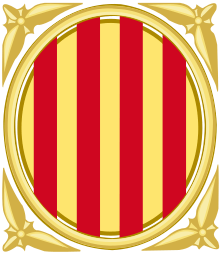President of the Government of Catalonia
| President of the Government of Catalonia
President de la Generalitat de Catalunya | |
|---|---|
 Emblem of the Generalitat | |
| Style |
El Molt Honorable Senyor (The Right Honourable) |
| Residence | Casa dels Canonges |
| Nominator | Parliament of Catalonia |
| Appointer | Monarch of Spain |
| Term length | Four years |
| Inaugural holder | Berenguer de Cruïlles (1359) |
| Formation | 1359 |
| Website | www.president.cat |
The President of the Government of Catalonia (Catalan: President de la Generalitat de Catalunya, IPA: [pɾəziˈðen də lə ʒənəɾəliˈtad də kətəˈluɲə]) is the deputy of the Spanish government in Catalonia and is one of the bodies that the Statute of Autonomy of Catalonia stipulates as part of the Generalitat de Catalunya, others being the Parliament, the government, the Consell de Garanties Estatutàries and the Síndic de Greuges. The president also serves as head of government of Catalonia, leading the executive branch of the Generalitat de Catalunya, the Catalan government.
The Parliament of Catalonia unilaterally declared independence from Spain on 27 October 2017. The Senate of Spain voted the same day on instituting direct rule, via Article 155 of the Spanish Constitution. Carles Puigdemont was dismissed and Spanish Prime Minister Mariano Rajoy dissolved the Parliament of Catalonia and called a snap regional election for 21 December 2017. The following day, Rajoy conferred on Deputy Prime Minister Soraya Sáenz de Santamaría the duties of President of the Generalitat.[1]
As of 15 May 2018, Quim Torra took on the title and powers of the President of the Government of Catalonia; after winning with a simple majority of 66 votes to 65 votes against and 4 abstentions the previous day in Parliament.
The current presidency
The President is elected by the Parliament of Catalonia and appointed by the King of Spain. The office has both representative and governmental functions.
Representative functions
The President holds the highest representation of the Generalitat and the ordinary of Spain in Catalonia. They are also in charge of the diplomatic relations with the other bodies of the state and with the rest of autonomous communities of Spain Catalonia shares interests with. The President is also responsible for calling for elections (which must be done at least every four years) and appointing the Consellers and other high offices as stipulated by law. As ordinary representative of the state of Spain in Catalonia, they promulgate laws in the region in name of the Spanish Parliament.
Governmental functions
The President is member of the Catalan government and leads and coordinates it. They select and may dismiss the Consellers, call for a meeting of the executive, and act as its chairperson. Further, they sign decrees accorded by the execuitive and order them to be published. They can also call for an extraordinary meeting of the Catalan parliament which, given the case, can be ordered to be dissolved or hold a general debate.
Moreover, the president must coordinate the legislative agenda of its government, the elaboration of general normatives and give all the information that parliament may decide to request.
See also
 |
|---|
| This article is part of a series on the politics and government of Catalonia |
|
Statutes and constitutions
|
|
Judiciary
|
|
Public order |
|
Divisions
|
References
- ↑ Ponce de León, Rodrigo (27 October 2017). "Rajoy cesa a Puigdemont y su Govern y convoca elecciones para el 21 de diciembre". eldiario.es (in Spanish). Retrieved 27 October 2017.
.jpg)